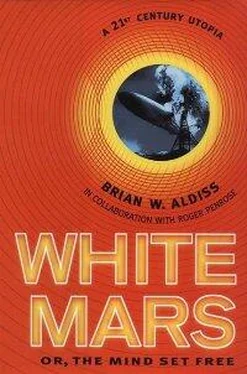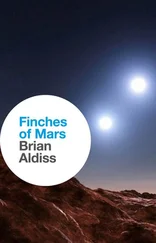Brian Aldiss - White Mars
Здесь есть возможность читать онлайн «Brian Aldiss - White Mars» весь текст электронной книги совершенно бесплатно (целиком полную версию без сокращений). В некоторых случаях можно слушать аудио, скачать через торрент в формате fb2 и присутствует краткое содержание. Год выпуска: 1999, ISBN: 1999, Издательство: Little, Brown UK, Жанр: Фантастика и фэнтези, на английском языке. Описание произведения, (предисловие) а так же отзывы посетителей доступны на портале библиотеки ЛибКат.
- Название:White Mars
- Автор:
- Издательство:Little, Brown UK
- Жанр:
- Год:1999
- ISBN:0-316-85243-0
- Рейтинг книги:5 / 5. Голосов: 1
-
Избранное:Добавить в избранное
- Отзывы:
-
Ваша оценка:
- 100
- 1
- 2
- 3
- 4
- 5
White Mars: краткое содержание, описание и аннотация
Предлагаем к чтению аннотацию, описание, краткое содержание или предисловие (зависит от того, что написал сам автор книги «White Mars»). Если вы не нашли необходимую информацию о книге — напишите в комментариях, мы постараемся отыскать её.
White Mars — читать онлайн бесплатно полную книгу (весь текст) целиком
Ниже представлен текст книги, разбитый по страницам. Система сохранения места последней прочитанной страницы, позволяет с удобством читать онлайн бесплатно книгу «White Mars», без необходимости каждый раз заново искать на чём Вы остановились. Поставьте закладку, и сможете в любой момент перейти на страницу, на которой закончили чтение.
Интервал:
Закладка:
On Mars we presented a case of all hearts beating as one.
The result of which was an unconscious sense of unity, even unanimity.
Poulsen had established a small research group within the scientific community. Kathi had referred to it. To be brief, the group had decided that an oscillating wave of some kind might serve as a sort of drumbeat to assist synchronisation. In the end, adapting some of Mary Fangold’s spare equipment, they had produced and broadcast a soundwave below audibility levels. That is to say, they had filled the domes with an infrasound drumbeat below a frequency of 16 hertz.
“You tried this experiment without consulting anyone?” I demanded.
“We consulted each other.” He spoke in the light, rather amused tone into which he frequently slipped. “We knew there would be protests from the generality, as there always are when anything new is introduced.”
“But what was the result of your experiment?”
Arnold Poulsen laid a thin hand on my shoulder, saying, “Oh, we’ve been running the beat for six days now. You saw the benevolent results in our discussion. All hearts beat as one. Science has delivered your Utopia to you, Tom … The human mind has been set free.”
I didn’t believe him. Nor did I argue with him.
Later, when I was lying with Mary, I told her of what Poulsen claimed to have done, for his pride in scientific ingenuity had irritated me. “To claim that an oscillating wave brought about our Utopia, instead of our own endeavours—why, you might as well claim that God did it…”
She was silent. Then she said, almost in a whisper, “I don’t want to sound unreasonable, but perhaps all those things conspired together…”
I kissed her lips: it was a better course than argument.
21
Dear Tom has been dead now for twenty years. He died at the youthful age of sixty-seven. I zeep these words in what would be midway through 2102 by the old calendar.
A statue to Tom stands at the entrance of the Strangers Hall of Aeropolis in Amazonis Planitia. It depicts him in an absurdly triumphalist pose. I never saw him stand like that. Tom Jefferies was a modest man. He regarded himself as ordinary.
But perhaps the legend below his name is correct:
Prime Architect of Mars—
2015-2082
The Man Who Made Utopia Part of Our Real World.
Did Tom love me? I know he loved Mary Fangold. They never married. Marriage had gone out of fashion. But they were In Liaison as the new rationalism has it.
Do I miss him? Probably I do. I did not remain on Mars. In my old age I have decided to move further out, to lighter gravities.
My daughter Alpha went to seek out those Lushan Mountains I painted for her when she was a child. But I find I am an independent animal, as long as I retain contact with my Other. So our lives unfold.
On the occasion when Tom’s just society was announced and its constitution read aloud, everyone was in a mood for rejoicing. We truly knew we had made a human advance.
Our proceedings, together with the celebrations that followed, were recorded as usual and, as usual, broadcast to Earth.
One incident of that day is vividly recalled. I had not seen my friends, Hal Kissorian and Sharon Singh, for some while—not, in fact, since their marriage—and longed for their company to make my happiness complete.
I rang their bell and was admitted. Both of them greeted me warmly. They were scantily dressed. As they embraced me, I smelt sweet and heavy odours about the room. We talked about all that was happening—or rather, I talked. I talked about Chimborazo and about the wonderful sense of social completeness we had managed to build. They regarded me with fixed smiles on their faces. I belatedly realised that the topics held little interest for them.
On the wall behind the sofa on which they sat was a hand-painted mural. I recognised a blue-skinned Krishna with his flute. Krishna was plump, his figure rather rounded in a girlish way, his eyes large and sparkling. Around him lounged pink ladies in diaphanous gowns, holding flower buds or tweaking one of the god’s oily locks scarcely contained by his crown. They all gazed with lascivious approval at his immense mauve erection.
“Well, that enough of my affairs,” I said. “What have you two been doing?”
Both Kissorian and Sharon burst into joyous laughter. “Shall we show you?” asked Sharon.
I came away with that curious mixture of shame and envy that people of the mind feel for people of the flesh.
It was then I decided I was a solitary person. With a numb heart, it is easy to behave like a true Utopian.
By the fifth year after the collapse of EUPACUS our society had settled on an even keel. All our various disciplines had taken root and were beginning to blossom. The Birth Room was a thriving institution. We had found room for diverse personalities to live together peacefully.
At that time, I visited the Birth Room frequently. I miss it now such things do not exist. I went not only for companionship but to enjoy the transformation in women’s personalities from their personae among men when they entered there. They became simpler and more direct, perhaps I should say unguarded, when they escaped from male regard.
Many were the arguments there about a possible return to Downstairs. By no means all women wanted it. Life Upstairs, although austere, was far less abrasive than it had been on Earth. Certainly child-rearing was easier, while the new generation of children seemed brighter and more companionable, despite their tammies.
Received wisdom was traded.
“Earth has decided to leave us here.”
“Let Downstairs get on with its affairs while we get on with ours.”
“They’ve forgotten all about us.”
Such remarks, often heard, were made with varying tones of optimism or gloom.
Olympus was moving steadily nearer. Observation showed, alarmingly, that its rate of progression was ever increasing. Various attempts to communicate with it failed. Willa and Vera, the mentatropists, had driven to the site, where they picked up a CPS, followed by a scrambled signal. The signal was intensively studied, but years passed before it was understood.
It was in that fifth year of our exile that Meteor Watch reported an object approaching Mars at a considerable velocity. Everyone was alarmed. But the speed of the object decreased. Eventually, a capsule shot from it, extruded a helichute, and landed a few kilometres north of the domes. An expedition set out immediately to investigate it.
The capsule bore a large symbol, TUIS, painted on its side. When transported into the domes and opened up, it was found to contain various medical supplies, scientific equipment, and a veritable store of foodstuffs, many of the names of which we had all but forgotten.
The supplies were accompanied by a plaque that read, “With the Admiration of the Terrestrial Utopian International Society”. We wondered at the title, which indicated that the times were changing Downstairs.
Early in our sixth year, which is to say six terrestrial years on the calendar to which we clung, notching up days like Crusoe on his island, the outer rim of Chimborazo appeared over the horizon, to be clearly viewed from both domes and science unit. Its leading edge seemed now to be approaching at a rate that was hard to credit—at least 500 metres a day. It was easy to imagine its paddles beating furiously through the underlying regolith. However, the speed of movement did not represent the motion of Chimborazo as a whole. Chimborazo’s scope encompassed more and more of the Martian surface, tumbling in our direction—a terrifying wave of regolith ploughed up before its prow.
Читать дальшеИнтервал:
Закладка:
Похожие книги на «White Mars»
Представляем Вашему вниманию похожие книги на «White Mars» списком для выбора. Мы отобрали схожую по названию и смыслу литературу в надежде предоставить читателям больше вариантов отыскать новые, интересные, ещё непрочитанные произведения.
Обсуждение, отзывы о книге «White Mars» и просто собственные мнения читателей. Оставьте ваши комментарии, напишите, что Вы думаете о произведении, его смысле или главных героях. Укажите что конкретно понравилось, а что нет, и почему Вы так считаете.










